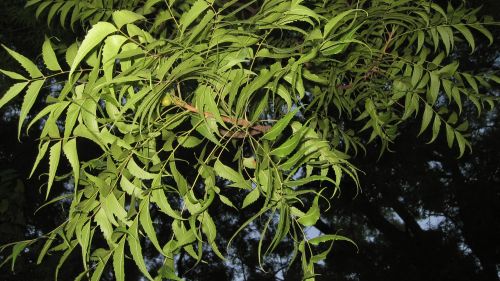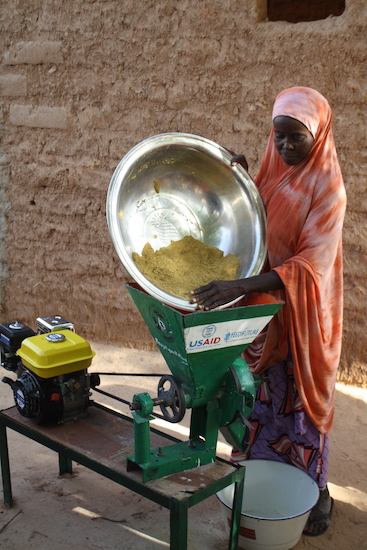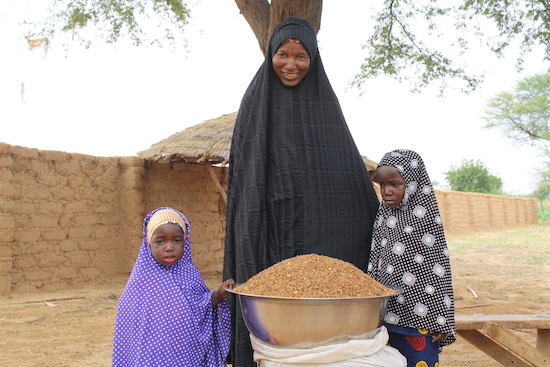Rural Niger Women Find Opportunity and Hope through Innovative Business Model

Researchers didn’t expect natural solutions to manage crop-destroying pests would inspire a cottage industry and female entrepreneurs in rural Niger.
When researchers set out to find natural ways to manage a crop-destroying pest in sub-Saharan Africa cowpea fields they knew the results could have a significant positive impact on smallholder farmers. What they may not have expected was the significance of the cottage industry it inspired and the entrepreneurial spirit of the rural women of Niger who led it.

Maruca vitrata, commonly known as the legume pod borer, is a real threat to African cowpea fields accounting for up to 80 percent crop loss. Researchers, led by Dr. Manuele Tamò from the International Institute of Tropical Agriculture (IITA) in Benin in collaboration with Prof. Ibrahim Baoua from the University of Maradi and Dr. Amadou Laouali from INRAN, Maradi, have been working to develop innovative cowpea pest management solutions that incorporate non-synthetic pesticide options. One option that provides natural protection against insects, including the legume pod borer, is derived from the seeds of the Neem tree.
New Opportunity from a Familiar Landscape
Indo Maman, Sa’a Moussa, and Aicha Mahaman all live in the African Sahel, in small villages in the Maradi region of Niger. Each woman is experiencing new opportunities afforded through the oval-shaped seed from the Neem, a tree they’ve known since childhood.
The Neem tree stands tall throughout this south-central section of Niger. Its oblong-shaped leaves appear almost palm like as they sway in the breeze and provide welcoming shade. Hanging from those palm-like branches are the seed of the Neem, the women’s seed of opportunity.

Innovation that Empowers
The research project has established Community Based Neem Production Units (CBNP) that the women have joined where they learned how to harvest the seeds of the Neem and manufacture them into natural pesticide packets. The packets are then sold to local farmers, co-ops and traders.
"The 'neem tea bag' was developed and tested with success by our Niger collaborators," explains Dr. Tamò. "We’ve expanded tea bag production into new communities and are seeing a potential to create a whole bio-pesticide value chain, creating job opportunities for women and youth.”
The CBNP project was funded through USAID’s Feed the Future Innovation Lab for Legume Systems Research managed by Michigan State University. Projects such as these offer opportunities to build resilience and set countries on a journey to self-reliance, a USAID goal.
Feed the Future, funded by USAID, is the U.S. Government’s Global Hunger & Food security initiative. It supports 20 Innovation Labs, which are led by U.S. universities collaborating with developing country research institutions to advance novel solutions to reduce global hunger, poverty, and undernutrition.
“The Legume Systems Innovation Lab is focused on investing in research for scaling of innovative solutions that provide a food-secure path forward for marginalized communities,” explains Dr. Barry Pittendrigh, an MSU Foundation Professor and the Lab Director. “Supporting the development and implementation of relevant technologies focused on youth, gender and resilience lead to self-sufficiency and empowerment. The CBNP project is just one example of how when provided with the knowledge and opportunity people engage in overwhelmingly positive ways.”
Educating and Inspiring
Dr. Tamò and his team are seeing enthusiastic participation. Each woman notes that along with the financial benefits of the neem tea bag enterprise the personal connections and the education they have gained that has had the biggest impact.
“My knowledge in the ecological management of pests has grown and so has the cohesion between our unit members and the producers,” says Indo Maman, a widow from the village of Danja in the Madarounfa Department who became involved in the program through the women farmer’s cooperative. She has used some of her earnings to pay for her grandson’s breakfast at school along with their extra fees and school supplies.
Her main job is in the threshing of the Neem grains, but Indo has big dreams. “I would like to organize advertising campaigns and market the tea bags on a larger scale, I dream to see the unit to be a big company.”
Aicha Mahaman, 55, is from Mai Ganga village in the Mayahi Department. “My role is in processing neem kernels into flour,” Aicha explains as she tends to her small herd of sheep recently expanded through her Neem profits.
She also shares Indo’s dream of one day building a neem processing company. “I believe producers will be ready to pay (for) the neem tea bag if affordable and (they) are well sensitized about the safety and effectiveness in reducing the population of cowpea pests.”
Strengthening Ties and Building Community
As president of the Farmer’s Cooperative in the village of Serkin Hatsi in the Guidan Roumdji Department, 43-year-old Sa’a Moussa was the initiator of the women’s organization. She participates in the neem processing through the packaging of the product.
“The activity is profitable not only because it generates income, but I have been able to weave relationships with other villages,” says Sa’a. The fertilizer bought from her profits has increased production of her farm. The additional income has also allowed her to purchase clothes for her grandchildren.
“I would like to see this industry grow.”
Niger at a Glance
Niger is a landlocked country located in the African Sahel region. According to USAID, an estimated 3.4 million Nigeriens are food-insecure and the illiteracy rate is 70%. The country often ranks at or near the bottom of the United Nations Human Development Index. The vast majority rely on subsistence farming to feed their families.
The information provided in this article is the responsibility of the author. It is not official U.S. Government information and does not necessarily reflect the views of the U.S. Agency for International Development or the U.S. Government.